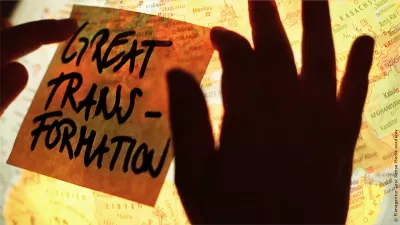
The Great Cooperation
The Great Cooperation
Die Große Kooperation

Scene from the Ben Toussaint film "What am I", one of the winners of the Germanwatch screenplay competition about the Great Transformation. Foto: © Filmagentur Lost Sense Media academy
The Arctic sea ice is melting at record speed. Droughts in the USA, Kazakhstan and Ukraine are pushing up the prices of basic foods. The increasing scarcity of energy and mineral resources is creating economic and social risks. The worsening crises in the climate, energy/resources and food security nexus demonstrate, almost daily, that we are reaching the limits to our use of the Earth’s resources – in other words, we are fast approaching its planetary boundaries. This has major consequences whose burden falls most heavily on the shoulders of the poorest and most vulnerable people in developing and emerging countries.
The economy’s fallback positions in response to the energy crisis often point in an unsustainable direction, such as the increased use of climate-damaging lignite or oil sands instead of the expansion of renewable energies. The search for solutions which merely treat the symptoms of the crises, instead of initiating radical and sustainable, whole-of-society change processes, does not bring us any closer to a “Great Transformation” towards a sustainable development (see article, p. 2). But the nexus of multiple crises, comprising development issues and planetary boundaries, is forcing us to rethink. Not only are we reaching the ecosphere’s limits: the knowledge available about these limits demonstrates the remarkable scale of the social and economic challenges we face.
But some initial signs of successful transformation processes can already be discerned: the civic engagement by private citizens in renewable energy communities in Denmark, business models for urban farming in New York, political demands for feed-in payments for renewable energies in India, and low-carbon zones in China (see article, p. 4). In Germany, one person in every ten is now a vegetarian, and in German cities the number of car-owners in the population is decreasing, especially in the key group, namely young adults. These trends point in the right direction. However, they need enabling policy frameworks if they are to progress (see interview, p. 2).
A particular challenge for the trend reversal is posed by the “spoilers” – mainly those who profit from the current systems. Those who say “no” to transformation are resisting the change processes that are necessary – also by exerting political influence. But instead of seeking to build protective walls around their role as yesterday’s winners, they should be developing their business models in such a way that they can utilise the opportunities afforded by the transformation of our energy systems. For Germany’s four major energy supply companies, this is the major challenge. Winning their commitment and support is key to the success of the Great Transformation. Similarly, the car industry is clinging to its outdated business models. It is having difficulty switching to sustainable mobility services such as car sharing or transport mixes which include rail rather than relying on the car alone. Instead, they are blocking the adoption of the legislation that is essential to reduce fuel consumption, also post-2020. In the agro-chemical industry, too, the dominant business models achieve their success at the expense of smallholder farmers and make a stronger role for organic farming almost impossible.
The Great Transformation can only be successful through cooperation between diverse sectors and stakeholders. In order to further strengthen the new initiatives and mainstream the dynamics of the Great Transformation both nationally and internationally, also in the UN bodies, new strategies for action, communication and cooperation are required. In view of the changed power constellations and shifts in wealth, this means rethinking North-South cooperation. But it is no less important – in a world in which “growth”, as the answer to major justice issues, is increasingly reaching its limits – to seek new solutions to these as well. The key issue that Germany and the EU should address is to enter into alliances or partnerships, especially with the countries most affected by the current crises – the small island states and Africa – and with actors of particular geopolitical significance such as the emerging countries. In light of the growing willingness to take action, which is becoming apparent in some emerging countries, but also in view of the USA’s incapacity to act, especially in the climate process, partnerships with the emerging countries – China and India, but also South Africa, the MENA region (see article on p. 4) and Brazil – are a particularly promising way forward for the EU. Topics addressed within these partnerships could include the transformation of energy systems, the Renewable Energy Sources Act, low-energy buildings, and emissions trading schemes. But it’s not only the EU which has a role to play here: a growing number of South-South partnerships are also proving their worth.
So what does this mean for the international NGO landscape? How can it respond to global changes, redefine its role(s) and engage creatively for the Great Transformation? What seems certain is that NGOs must coordinate their positions on a Great Transformation across countries and continents and must pursue this transformation through a division of labour and old and new forms of action. Germanwatch supports this transformation through national and international dialogue and strategy processes which we are keen to share with you in this latest issue of our newspaper.
Rixa Schwarz, Stefan Rostock
